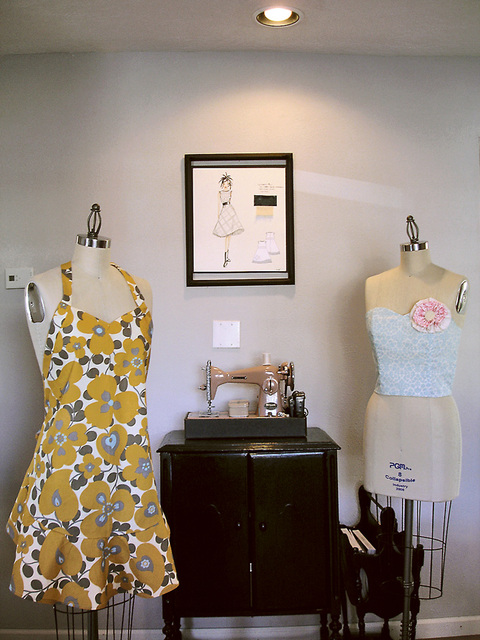As a child, Teresa Romero didn’t have the patience to learn how to sew. Her mother, Patty Melvin, a self-described “old-school” seamstress, tried with little success to teach her daughter what she herself had learned from her own mother and grandmother. It wasn’t until Romero went to San Francisco’s Design Institute, where sewing is required, that she picked it up again. Now, more than a decade later, she’s decided to make teaching others how to sew and design her job.Romero returned to New Mexico in August of this year and, with her mom, opened Designer’s Lounge in October. Designer’s Lounge is a small boutique-like space in Nob Hill that offers classes targeted to every skill level, from an introduction to the sewing machine to designing and draping (as well as my favorite, making capes for dogs). On a recent Saturday afternoon, I took a class called “Awesome Apron.” I am at best a novice crafter, with a handful of knitted items and a few Christmas stockings to my name. Growing up, I had no desire to learn how to do anything remotely “domestic,” including baking, sewing and the perfect executing of hospital corners. To my mind, these activities were indelibly connected to the sort of housewifely role I wanted no part of inheriting. The “chocolate chip cookie-shaped pillow episode” of ’88 sealed the deal. With straight As save for a C in Home Ec, I was convinced that handicrafts and I would do best to keep far away from each other.My personal experience is relevant only in that it is not unique. At some point (that point being my generation), the venerable chain of mothers teaching daughters the necessary craft of sewing broke. Modernization and the change in expectations about what women could, and should, do made skills such as sewing seem antiquated. This break in tradition was liberating, but also resulted in my once looking up a recipe for boiling water. In this decade, though, crafting (as it’s now trendily termed) was picked up by hip ladies centered primarily in Portland, Ore., and Brooklyn, N.Y. Once signs of domesticity, embroidery, knitting and even quilting were co-opted and made edgy by the liberal application of skulls. The new line on feminism and femininity is that it’s OK to do all that stuff your grandma did, but only if you want to and are doing so as a celebration of choice. If you’re expected to, that’s not cool.Though crafting has seen a remarkable resurgence in popularity, it still suffers from the same stigma that plagued earlier generations: If it’s made by a lady and has a practical use, it’s not art. This is undeniably changing, as attitudes toward folk art, outsider art and domestic art have become more inclusive. But it still exists. Romero is aware of this stigma, which is part of the impetus behind opening Designer’s Lounge. She worked for years in the fashion industry and says that research into vintage garments, laces and fabrics has given her a tremendous appreciation for fashion, and consequently, sewing. “Anything that is made by hand takes time, patience and imagination,” Romero says. “Anything that expands the imagination, draws out creativity, as a tangible form of expression should be considered art.”While this certainly holds true for much of what Romero does (designing, illustrating, draping), I’m more reluctant to tag my new apron as art, mostly because of my own ineptitude. The two-hour class I took extended to four hours, due almost entirely to my inability to pin fabric. But it was a blast, and Romero is a wonderful teacher. Just as wonderful was having her mother there, helping not only me but Romero’s boyfriend, who just that week had decided to learn how to sew and was making a pretty impressive pair of pajama pants. My apron, while not technically perfect, is far and away the most complicated project I’ve ever completed on a sewing machine. There’s no way I could have done it on my own, a copy of Sewing for Dummies spread mutely in front of me. That’s because people aren’t supposed to learn how to sew from a book, but rather from a community of people like Romero and Melvin, daughter and mother. “I’ve been sewing my whole life,” Melvin says, “and every time I finish something, it makes me so happy.” This is what gets passed on—not just knowledge, but passion. And that’s why my own mom and I are taking a class together soon. Though it’s been years since she’s sat in front of a machine, my mom learned to sew from her mom, and once our bobbins are wound, I think she’ll have a few things to teach me.
Designer’s Lounge, located at 3218 Silver NE, is open Tues.-Fri. 11 a.m. to 8 p.m. and Sat. 10 a.m. to 6 p.m. Closed Sun. and Mon. Browse the schedule of classes and more at www.designandlounge.com.









